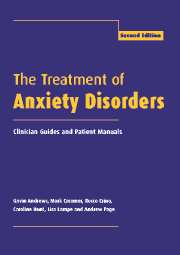Book contents
- Frontmatter
- Contents
- List of authors
- Preface to the second edition
- Abbreviations
- 1 Read me
- 2 General issues in anxiety disorders
- 3 General issues in treatment: Clinician Guide
- 4 Panic disorder and agoraphobia: Syndrome
- 5 Panic disorder and agoraphobia: Treatment
- 6 Panic disorder and agoraphobia: Clinician Guide
- 7 Panic disorder and agoraphobia: Patient Treatment Manual
- 8 Social phobia: Syndrome
- 9 Social phobia: Treatment
- 10 Social phobia: Clinician Guide
- 11 Social phobia: Patient Treatment Manual
- 12 Specific phobias: Syndrome
- 13 Specific phobias: Treatment
- 14 Specific phobias: Clinician Guide
- 15 Specific phobias: Patient Treatment Manual
- 16 Obsessive-compulsive disorder: Syndrome
- 17 Obsessive-compulsive disorder: Treatment
- 18 Obsessive-compulsive disorder: Clinician Guide
- 19 Obsessive-compulsive disorder: Patient Treatment Manual
- 20 Generalized anxiety disorder: Syndrome
- 21 Generalized anxiety disorder: Treatment
- 22 Generalized anxiety disorder: Clinician Guide
- 23 Generalized anxiety disorder: Patient Treatment Manual
- 24 Posttraumatic stress disorder: Syndrome
- 25 Posttraumatic stress disorder: Treatment
- 26 Posttraumatic stress disorder: Clinician Guide
- 27 Posttraumatic stress disorder: Patient Treatment Manual
- 28 Conclusions
- References
- Index
9 - Social phobia: Treatment
Published online by Cambridge University Press: 05 August 2016
- Frontmatter
- Contents
- List of authors
- Preface to the second edition
- Abbreviations
- 1 Read me
- 2 General issues in anxiety disorders
- 3 General issues in treatment: Clinician Guide
- 4 Panic disorder and agoraphobia: Syndrome
- 5 Panic disorder and agoraphobia: Treatment
- 6 Panic disorder and agoraphobia: Clinician Guide
- 7 Panic disorder and agoraphobia: Patient Treatment Manual
- 8 Social phobia: Syndrome
- 9 Social phobia: Treatment
- 10 Social phobia: Clinician Guide
- 11 Social phobia: Patient Treatment Manual
- 12 Specific phobias: Syndrome
- 13 Specific phobias: Treatment
- 14 Specific phobias: Clinician Guide
- 15 Specific phobias: Patient Treatment Manual
- 16 Obsessive-compulsive disorder: Syndrome
- 17 Obsessive-compulsive disorder: Treatment
- 18 Obsessive-compulsive disorder: Clinician Guide
- 19 Obsessive-compulsive disorder: Patient Treatment Manual
- 20 Generalized anxiety disorder: Syndrome
- 21 Generalized anxiety disorder: Treatment
- 22 Generalized anxiety disorder: Clinician Guide
- 23 Generalized anxiety disorder: Patient Treatment Manual
- 24 Posttraumatic stress disorder: Syndrome
- 25 Posttraumatic stress disorder: Treatment
- 26 Posttraumatic stress disorder: Clinician Guide
- 27 Posttraumatic stress disorder: Patient Treatment Manual
- 28 Conclusions
- References
- Index
Summary
Aims of treatment
The aims of treatment are symptom reduction and improved function. Elimination of all anxiety is unlikely (and unnecessary), and the therapist has a role in helping the patient to set realistic goals for therapy. Psychological and pharmacological treatments are available for social phobia. The treatments for which there is most evidence of efficacy are cognitive and exposure-based treatments, social skills training packages, antidepressant medication and benzodiazepine anxiolytics. In general, outcome is related to severity of symptoms at pretreatment. Psychological treatments for social phobia
Social skills training
The role of social skills training in the treatment of social phobia continues to be debated. Prior to the publication of DSM-III, social skills training had demonstrated clinical utility in heterogeneous populations of psychiatric outpatients with social skills difficulties or anxieties (Stravynski et al., 1982;filazlo et al., 1990). Hence it was proposed that these techniques be applied to the treatment of social phobia. Reviewers agree that few of the early studies that examined social skills treatments were methodologically sound (Marks, 1985;Heimberg, 1989; Stravynski and Greenberg, 1989;Mattick et al., 1995); in particular, only rarely was a control condition in evidence. Diagnostic groups were often heterogeneous or poorly defined. No differentiation was made between those with and those without avoidant personality disorder (APD). In addition, strategies referred to as social skills training often included explicit instructions more consistent with exposure therapies, e.g., to regularly confront their fears and to persist in the situation until anxiety diminished (filazlo et al., 1990).
Part of the argument over the role of social skills training centers on whether apparently poor social skills are the result of actual skills deficits, or really due to inhibition of skills expression due to anxiety. Turner et al. (1986) examined thesocial skills of patients with social phobia, comparing those with and without avoidant personality disorder. They found that patients with social phobia alone felt anxious, and perceived that others found them anxious and inadequate, but in fact had appropriate social skills. Those with APD were found to be markedly lacking in social skills. However, the authors were unable to exclude profound inhibition in social situations as the underlying cause giving rise to the appearance of skills deficits: in APD, severe anxiety related to a core schema that social error will lead to rejection can result in profound social inhibition and avoidance.
- Type
- Chapter
- Information
- The Treatment of Anxiety DisordersClinician Guides and Patient Manuals, pp. 164 - 176Publisher: Cambridge University PressPrint publication year: 2002



